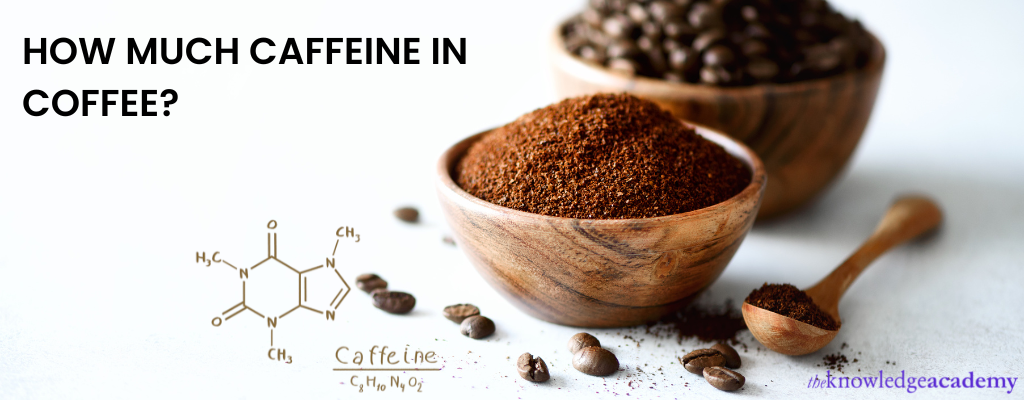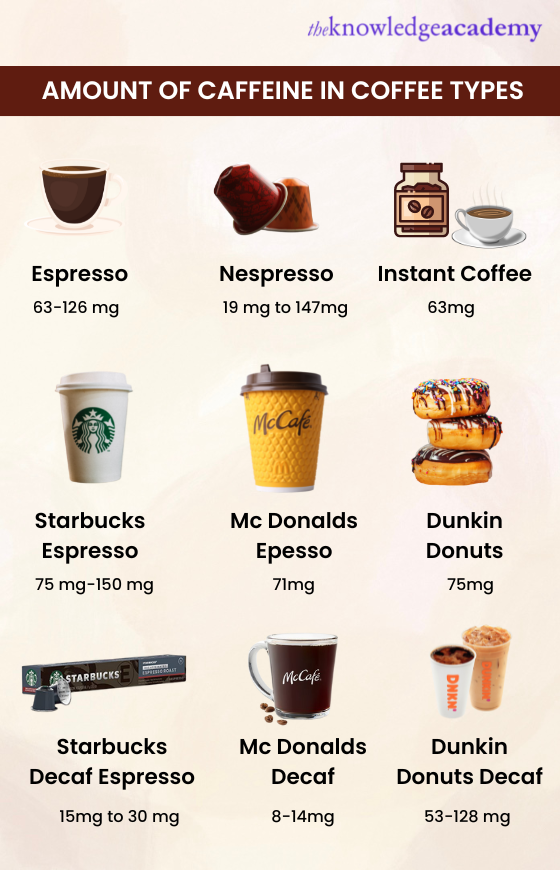We may not have the course you’re looking for. If you enquire or give us a call on 01344203999 and speak to our training experts, we may still be able to help with your training requirements.
Training Outcomes Within Your Budget!
We ensure quality, budget-alignment, and timely delivery by our expert instructors.

Coffee is a staple in most people's daily routines and the most prominent caffeine source. A cup of Coffee generally contains 80 to 100 milligrams (mg) of caffeine. Still, the amount of Caffeine in Coffee varies depending on several factors, including the Coffee type, the brand of Coffee, and the brewing method.
Research by the National Library of Medicine shows that 85% of American adults consume about two cups of Coffee daily, an average of which equals the caffeine of about 180 mg per day. Check out this blog to learn How Much Caffeine in Coffee is good for your health and what factors affect caffeine content.
Table of contents
1) What is caffeine?
2) Effects of caffeine on the body
3) The caffeine content in Coffee by type
4) The caffeine content in Coffee by brand
5) Is Decaffeinated Coffee better?
6) Conclusion
Sign up for our Industry Training Course to imbibe insights into coffee brewing, floristry and phone repairing!
What is caffeine?
Many adults rely on Coffee for the early morning boost, but even most dedicated Coffee lovers may not know what caffeine is and how it works. It is a natural stimulant found in natural sources like Coffee, tea, and chocolate, making it the most widely consumed psychoactive drug in the world.
Caffeine acts on the central nervous system, triggering the release of chemicals such as adrenaline and cortisol and boosting brain activity. Many people drink Coffee for its energising effects, but overconsumption causes dehydration, anxiety, and dizziness. Reaction to caffeine depends significantly on an individual's sensitivity to it and the amount consumed.
Effects of caffeine on the body
Caffeine is water-soluble and thus bypasses the blood and brain barrier after ingestion. As a result, it's found in various body fluids like saliva and cerebrospinal fluid. It works by binding to adenosine receptors located within the central nervous system and the peripheral nervous system. Caffeine also affects various organs, such as the heart and blood vessels. Adenosine is a molecule involved in the biochemical pathways of your body, mainly energy transfer and signalling.
Caffeine intake generally starts during childhood; commonly, children consume it in the form of chocolate, chocolate milk, and soda. As children grow up, consumption of products like soda during the pre-teen and teenage years significantly increases. Followed by other caffeine-dense products like energy drinks and, of course, Coffee. While the average amount of caffeine consumption in children is only 50mg a day, it increases significantly in adults, up to 180 mg daily.
Pregnancy
The half-life of caffeine is more prolonged during pregnancy on average and may be as much as 16 h longer than usual. This means that its effects will last longer in women and the foetus. American College of Obstetricians and Gynecologists (ACOG) says that pregnant or nursing women can safely consume 200 mg or one small cup of Coffee daily without negatively impacting the unborn foetus or baby.
However, a person may still want to consult with a doctor on the best daily dose of caffeine for them. Given caffeine's effects on brain development, the increased half-life in pregnant women should be considered when considering safety issues. This is why many women on maternity abstain from consuming Coffee.
Infancy
Caffeine elimination is slower during early infancy. Elimination is likely to be at least as slow in the foetus. Foetal exposure to caffeine during pregnancy may potentially have long-lasting effects, especially in the brain.
Substance Use
Smoking doubles the rate of caffeine clearance by increasing liver enzyme activity, which may explain the higher Coffee consumption rate among smokers. Meanwhile, alcohol intake increases the half-life of and decreases its clearance.
The caffeine content in Coffee by type

There are many variables regarding how many mg of caffeine is present in Coffee. It includes type of Coffee beans used, measurement, roasting Coffee beans, brewing method, etc. Such factors cause the caffeine content within a cup of Coffee to varying significantly depending on the type of Coffee consumed.
Espresso
It is made by running pressured hot water and steam through the ground Coffee. It results in high caffeine extractions of 63mg in a single shot and 126 mg in a double shot.
Latte
Made by layering espresso Coffee with steamed milk, the ratio of milk and water determines the drink. It can be deduced that a single shot of latte delivers 63mg of caffeine, and a double shot contains 126mg, as milk and water have no caffeine content by themself.
Nespresso
Made using pods and capsules of ground Coffee, the content varies depending on the variety and amount of Coffee inside the pod. The Nespresso capsule with pure Arabica typically brews a 40ml shot with 65mg of caffeine. An independent scientific study of Nespresso pods found that the caffeine content varies from 19 mg to 147 mg.
Instant Coffee
Made by freeze-drying brewed Coffee, thus removing any moisture, the caffeine content varies enormously with the brand of this Coffee. USDA states two tablespoons of instant Coffee have 63mg of caffeine.
Interested in more varieties of Coffee? Join our basic barista course online, and learn about various brews!
The Caffeine content in Coffee by brand
Commercial brands tend to contain more caffeine per serving than home-brewed varieties. Coffee shops are also notoriously known for their larger cups to sell more Coffee, up to 700 ml of Coffee, five times as much as regular Coffee.
Starbucks
Probably the best-known Coffee shop in the world, it offers the most caffeinated Coffee, the caffeine content of brewed Coffee being as follows:
1) Short: 180mg
2) Tall: 260mg
3) Grande: 330mg
4) Venti: 415mg
One shot of espresso Coffee at Starbucks contains 75 mg of caffeine. Consequently, small espresso-based drinks contain 75 mg, such as lattes, cappuccinos, macchiatos, Americanos, and other Coffees. Larger sizes, made with two or even three espresso shots, likewise contain 150 mg to 225 mg.
McDonald’s
McDonald's sells Coffee worldwide, often under their McCafe brand. Despite being one of the biggest fast-food chains that sell Coffee, they don't standardise the amount of caffeine in their Coffee. The estimated caffeine content of their brewed Coffee is about:
1) Small: 109 mg
2) Medium: 145 mg
3) Large: 180 mg
Their espresso contains 71 mg per serving.
Dunkin Donuts
Dunkin Donuts is another very popular chain of Coffee and doughnuts. The caffeine content of their brewed Coffee is as follows:
1) Small: 215 mg
2) Medium: 302 mg
3) Large: 431 mg
4) Extra-large: 517 mg
A single espresso Coffee shot contains 75 mg of caffeine; the same can be expected from all espresso-based drinks.
Is Decaffeinated Coffee better?
When Coffee or tea says “decaffeinated,” does it mean it has no caffeine? Not quite, Decaf Coffee have less of it than its regular counterparts, but they still do contain some of it. For example, decaf Coffee typically has 2-15 mg in an 8-ounce cup.
Decaf Coffee from Starbucks contains 15 to 30 mg of caffeine, depending on the cup size. At the same time, Mcdonald's decaf contains about 8–14 mg. Decaf Coffee from Dunkin Donuts may also include a lot; a small cup has 53 mg, and a large cup contains 128 mg. That's almost as much as regular Coffee in other brands. If you are medically prone to react to caffeine negatively, you may want to avoid these beverages altogether.
Conclusion
Caffeine can still be part of a healthy adult’s diet, having many benefits such as boosting mood and accelerating metabolism. It's only unsafe when the consumption rate is too high, and you must understand How Much Caffeine in Coffee is healthy for you.
For a healthy adult, approximately 200 to 400 mg of caffeine per day (up to about four or five cups of Coffee) won't cause a problem unless the person has pre-existing health issues. It's necessary to consult medical professionals if any problem arises so that you can enjoy your delicious cup of Coffee with no worries.
Frequently Asked Questions
Upcoming Business Skills Resources Batches & Dates
Date
 SAFe® Agile Product Management Training
SAFe® Agile Product Management Training
Tue 28th May 2024
Mon 22nd Jul 2024
Mon 16th Sep 2024
Mon 25th Nov 2024
Mon 3rd Feb 2025
Mon 28th Apr 2025
Mon 9th Jun 2025
Mon 4th Aug 2025
Mon 1st Sep 2025
Mon 27th Oct 2025







 Top Rated Course
Top Rated Course



 If you wish to make any changes to your course, please
If you wish to make any changes to your course, please


